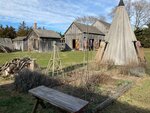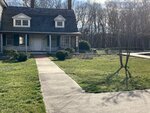

An approach to landscaping that’s taken root in Suffolk County has established a home at the Havens Homestead in Center Moriches. Its team of master gardeners work to recreate garden beds with indigenous plantings, many of which can be traced to the 1740s when seeds were purchased by the Ketcham Inn proprietors.
Their submission for a planned 1200-square-foot addition was among 11 winning grant proposals submitted to Rewild Long Island’s 2023 competition. Through this and other initiatives, the nonprofit Port Washington organization works to establish beautiful, easy-to-maintain gardens for homes and public spaces like the Sands Point Preserve and the Nassau County Museum of Art.
Part of an effort to revitalize and sustain healthy waterways that support fish and local wildlife, rewilding promotes better landscaping choices through education, example, and outreach. It discourages the use of artificial fertilizers on lawns and farms to reduce nitrogen runoff that seeps into groundwater and flows into bays and streams, poisoning fish and wildlife and increasing algal blooms.
As the name suggests, rewilding negates efforts to artificially control the natural environment.
It is modeled on a massive ecological experiment by architect Isabella Tree and her husband, Charlie Burrell, who stopped using long-established, but largely unsuccessful, techniques to manage Knepp, their 3,600-acre dairy farm in Sussex, U.K. They gave up the dairy, opting instead to allow nature to retake fields, meadows, and woodlands. Twenty years on, the result is an inspiring, healthy biodiversity, including wildlife species not seen in England in 600 years.
Locally, Jane Corrarino, one of the Havens Estate’s master gardeners, cites the importance of soil health to a successful garden project. It starts with the elimination of commercial fertilizers.
In a mutually beneficial, symbiotic relationship, the naturally occurring fungi attached to the root of a plant is a source of nutrients specific to its needs. The strength of artificial fertilizers shuts down the natural process, creating a “plant on steroids” effect that overwhelms and weakens it.
Instead, she recommends an annual consultation with the Cornell Cooperative Extension in Riverhead (631-727-4126), where you can get compost, have a soil pH test, and specific options to improve your soil quality.
Rewilding also means a shift toward native plants. Plants that grow naturally are adapted to the features of that environment. Unlike nonindigenous species, they thrive with minimal care and little or no maintenance. They help sustain native pollinators, birds, and other wildlife, thus supporting an ecosystem.
When leaves remain through winter, dormant larvae like caterpillars and bee eggs laid in hollow twigs hatch in spring. We lose valuable insects that help feed birds, fertilize crops, and create honey and more when we indiscriminately remove yard material, or do so too early. Leaves also provide nutrients for the soil. Using wood chips instead of mulch reduces weeds. Paths laid with pine needles are an attractive alternative to painted or paved surfaces.
To this end, the gardens at the Ketcham Inn contain plants authentic to its history, including kitchen garden plantings from 1740, traced from invoices for purchases from Bartram’s Nursery in Philadelphia and Prince Nursery in Flushing, N.Y. Great care was taken to ensure authenticity, respect tradition, and support the environment. Tours are available. Visits are encouraged.
For more information:
ketchaminnfoundation.org; (516) 712-0996
“Wilding” (2018); “Wilding: How to Bring Wildlife Back, An Illustrated Guide” (2024). Isabella Tree.
L.I. Native Plant Initiative (LINPI); POB 1279 Hampton Bays, N Y 11946: info@linpi.org.
Rewild Long Island: rewildlongisland.org; info@rewildlongisland.org:
(516)206-0608.
Save The Great South Bay: Bay Friendly Yards program,
savethegreatsouthbay.org; (646) 827-0733.
Comments
No comments on this item Please log in to comment by clicking here